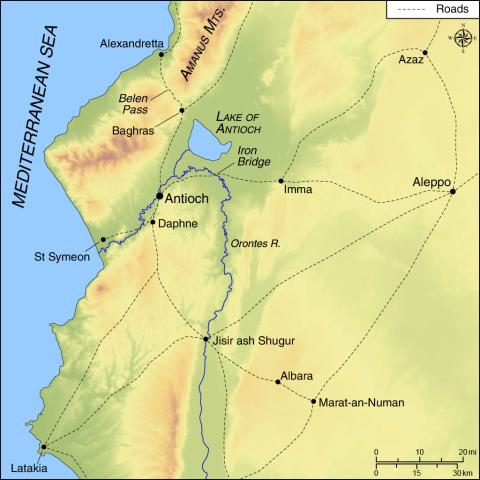Kerbogah Tries to Retake Antioch
[9.22.6] Dīxit illī Curbaram: “Māter cārissima, dīc mihī omnia quae in corde meō sunt incrēdula.” Quae ait: “Hoc, cārissime, libenter faciam, sī scierō ea quae tibi sunt incognita.” Cui ille dīxit: “Nōn sunt igitur Boamundus et Tancredus Francōrum diī, et nōn eōs līberant dē inimīcīs suīs? Et quod ipsī mandūcant in ūnō quoque prandiō duo mīlia vaccās et quātuor mīlia porcōs?”
Respondit māter: “Fīlī cārissime, Boamundus et Tancredus mortālēs sunt sīcut aliī omnēs, sed deus eōrum valdē dīligit eōs prae omnibus aliīs, et virtūtem proeliandī dat eīs prae cēterīs. Nam deus illōrum—est Omnipotēns nōmen ēius, quī fēcit caelum et terram et fundāvit maria et omnia quae in eīs sunt; cūius sēdēs in caelō parāta in aeternum, cūius potestās ubīque est metuenda.” Ait fīlius: “Sī ita est causa, cum eīs proeliārī nōn dēsinam.” Itaque audiēns māter ēius quod nūllō modō acquiēsceret cōnsiliīs suīs, maestissima recessit retrōrsum in Aleph, dēferēns sēcum cūncta spolia quae condūcere potuit.
notes
(June 1098) Kerbogah asks his mother for clarification: aren't Bohemond and Tancred actual gods, with enormous appetites? His mother replies that they're ordinary men, favored by their god. Kerbogah replies that in that case he will fight them, and his mother gives up and returns Aleppo.
omnia quae in corde meō sunt incrēdula: “all the things which are in my heart (and) not to be believed.” Kerbogah wants more details; the things he doesn’t believe (incrēdula) are things he doesn’t understand.
Nōn sunt igitur: CL would be nonne sunt igitur.
et nōn eōs līberant dē inimīcīs suīs = et nōn līberant (Francōs) dē inimīcīs suīs. CL would be ab inimīcīs suīs or ab inimīcīs eōrum.
Et quod ipsī mandūcant: “and (is it not true) that they (Bohemond and Tancred) eat.”
prae omnibus aliīs: “more than all others.”
quī fēcit caelum et terram, etc.: Exodus 20:11.
Sī ita est causa: "if this is the cause (of your concern)"; CL would be etsī, “even if.”
dēferēns sēcum cūncta spolia quae condūcere potuit: “taking with her everything on which she could lay her hands” (Hill).
vocabulary
mandūcō (1): to eatf
fundō (1): to establsh (OLD 3)
acquiēscō acquiēscere acquiēvī: to be satisfied with; to obey willingly (OLD 5)

